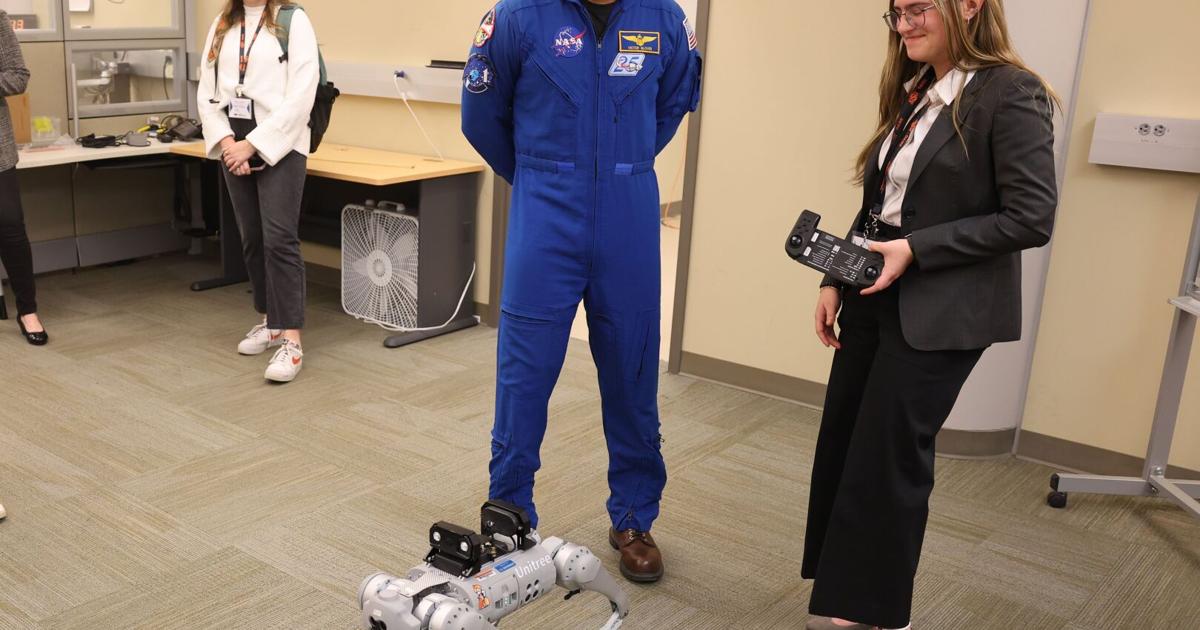Artemis II astronaut shares experience with space workshop at OSU-Tulsa
Navy Capt. Victor Glover, one of the speakers at the Human Research Program for Civilians in Spaceflight and Space Habitation workshop held on the Oklahoma State University-Tulsa campus, spent nearly six months aboard the International Space Station. Navy Capt. Victor Glover spoke at a workshop at the Oklahoma State University-Tulsa campus about the effects of long-term space habitation on the human body and mind. The session was part of the Human Research Program for Civilians in Spaceflight and Space Habitation, which included discussions of how to gather and share information about the ways space affects humans, particularly non-astronauts. This is part of a larger effort by former 1st District Congressman and former NASA Administrator, Jim Bridenstine, who is involved in commercial space endeavors that he hopes will revitalize Tulsa's space industry sector. The conference was attended by about 300 people worldwide, with about half attending in person and half via telecommunications.

Published : one year ago by randy krehbiel, Randy Krehbiel Tulsa World, stephen pingry in Science
Navy Capt. Victor Glover is one of the few humans who can speak from experience about the effects of long-term space habitation on the human body and mind.
"Everything changes," Glover said Wednesday. "Everything."
Glover, one of the speakers at the Human Research Program for Civilians in Spaceflight and Space Habitation workshop held Tuesday and Wednesday on the Oklahoma State University-Tulsa campus, spent nearly six months aboard the International Space Station.
That was relevant because the workshop was devoted to discussions of how to gather and share information about the ways space affects human beings — and especially humans not as finely tuned physically and mentally as astronauts.
Documenting space's impact on something closer to the average person — the kind who might venture into the void via commercial work or travel — is one of the things former 1st District Congressman and former NASA Administrator Jim Bridenstine is working on these days.
Bridenstine is involved in commercial space endeavors, several of which he hopes might restart Tulsa's once-flourishing space industry sector. In the case of health-related space research, Bridenstine is working with OSU-Tulsa and the OSU Center for Health Sciences.
In opening this week's workshop, Bridenstine said 90 non-astronauts have gone into space over the past two years. That includes a 90-year-old William Shatner, an 82-year-old Mary Wallace "Wally" Funk, and people with heart and other medical conditions.
Astronauts and scientists have long known that space, and especially the weightlessness of space, changes the human body. Bones and muscles weaken. Eyeballs change shape — a condition known as Space-Associated Neuro-Ocular Syndrome. Blood does not always freely circulate.
And that's only part of it.
"The place we don't talk enough about, though, is the emotional. The mental," said Glover, who is scheduled to pilot Artemis II around the moon and back next year in preparation for the United States' first crewed lunar landing in more than a half-century later this decade.
"It wasn't until we got back from space that I realized I was really displaced. I couldn't have even told you what it was. And then, about a year after I got back, … I said, 'Hew, I'm back.'"
But something else was going on. For about a year, Glover said, he was in a kind of doldrums.
"It was like hypoxia," he said. "We do training in this for military aviation, where we let you go hypoxic in an altitude chamber and then we have you put on the oxygen mask. You don't really know how bad you are until you take that first breath of good oxygen. And then you're like, 'Oh, all of the color came back! I can do this math problem!' You don't know how bad you are until after that."
Glover suspects that at least some of what he experienced was a sort of deflation after completing a mission on which he'd been focused for seven years. Once it was over, it took a while to find his bearings.
"As we dig in, I think we're going to find that it's a small thing that has a cumulative affect," Glover said.
Bridenstine said about 300 people worldwide signed up for the conference, with about half attending in person and half via telecommunications.
In his opening comments, Bridenstine related Tulsa's early connections to the U.S. space program, especially the Apollo program, which sent Americans to the moon. That was largely through the influence of Oklahoma's U.S. Sen. Robert S. Kerr, whose lieutenant, James Webb, became NASA administrator in the Kennedy Administration.
Bridenstine noted that Tulsa was also the site of the first international conference on peaceful uses of space.
"These were people from all over the globe," Bridenstine said. "They came to Tulsa to say, 'What do we want to utilize space for? How can we make the utilization of space peaceful?' At that time they were talking about communications and navigation and science and discovery.
"What do we do today?" he asked. "We're descending on Tulsa as an international body to come up with ways to not only continue to utilize space peacefully but advance it in a responsible and safe way."
Topics: Oregon State University, Space
